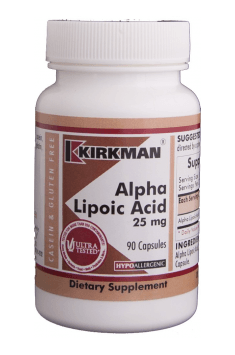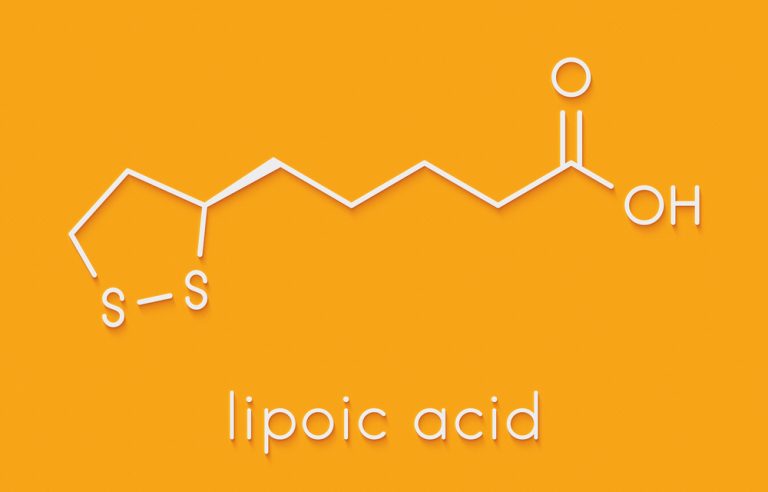Another supplement, which we scrutinized, is alpha-lipoic acid. This naturally-occurring compound turns out to be not only the support for out health, but also additional way to intensify training benefits. In this article you will find out about its properties, where to find it and if its if worth using it.
What is alpha-lipoic acid?
ALA, i.e. alpha-lipoic acid, is an organic chemical compound, which belongs to the group of saturated fatty acids. Thioctic acid, as it is also its common name, exhibits good solubility both in fats and in water. In the human organism it is identified with two basic functions. First of all, ALA constitutes a very strong antioxidant, which undoubtedly is important for our metabolism. Destroying a considerable amount of free radicals constitutes a very good way to detoxify the whole organism and restoring its proper homeostasis. Apart from this, alpha-lipoic acid is one of the compounds responsible for the transformation of food into energy. Despite the fact that it is produced by the organism, obtaining its antioxidant properties requires additional support in the form of supplementation.
Effects of alpha-lipoic acid
A precise mechanism of the activity of ALA is more complex. Strong antioxidant effect, which is based on sweeping harmful free radicals, contributes to a range of positive changes. It considerably limits damages in the membranes of neurons, prevents deficits of blood transported to nerves and inhibits the process of cell aging. Thioctic acid is also a very good intensifier for the activity of other antioxidants, mainly vitamin C and E. Moreover, this compound successfully protects liver by increasing the concentration of its main guard, i.e. cysteine, one of the basic biogenic amino acids. This substance allows to eliminate heavy metals from the organism and its decarboxylation allows to produce taurine.
ALA and cardiovascular system

Alpha-lipoic acid is also successfully used in the prophylaxis of the diseases of the circulatory system and heart. To a large extent it is recommended in case of atherosclerosis and hypertension, as it successfully lowers blood pressure. ALA’s activity also leads to better relaxation of heart muscle, which considerably decreases the risk of developing many diseases. Thioctic acid has also found its application in the therapy of many psychological and neurodegenerative diseases and also in case of inflammatory and degenerative problems in the musculoskeletal system.
ALA for fat loss
The properties of ALA have also been appreciated by people who try to lose weight and get rid of excessive kilograms. Apart from strongly detoxifying character, alpha-lipoic acid is also responsible for more efficient transformation of the food we eat into energy. It is also worth adding, that alpha-lipoic acid regulates the level of sugar in blood. All of this thanks to the fact that this compounds considerably intensifies the transformation of glucose to the form of incredibly valuable glycogen. At the very end, we cannot forget about the fact that ALA strongly limits excessive appetite and uncontrolled hunger. The ability to transform glucose to glycogen has found yet another group of recipients – sportsmen.
ALA and insulin sensitivity
Glycogen, as commonly known, is our energy reservoir, which is essential during intensive physical effort. Therefore, it may assume that this acid has direct influence on limiting fatigue and the increase of training endurance. Alpha-lipoic acid is also responsible for the growth and sensitivity of our muscles to insulin, which has undisputed influence on the process of building muscles.
ALA and training efficiency
This is, however, not the end of the application of alpha-lipoic acid in sports. As already mentioned, ALA constitutes a great way to increase the protection of the circulatory system, which is very important in case of every sports discipline. Better functionality of the heart and increased detoxification of the system is reflected in the improvement of total physical condition. It is also worth mentioning that alpha-lipoic acid contributes to more effective production of taurine. This compound is commonly used in sports supplementation as a preparation causing maximization of the transport of creatine and amino acids to muscles. What is more, taurine allows to considerably improve cell metabolism and regulate the functionality of the whole nervous system. ALA is often used as protection during using anabolic steroids.
Dosing and occurrence
Dosing of alpha-lipoic acid is dependent on the goal, for which it is to be utilized. In case of the prophylactic effect, usually the portions of 300 mg of the preparation are recommended during the day.
Sportsmen and people leading intensify lifestyle should take the dose of 600 to 1200 mg of alpha-lipoic acid. ALA may be provided to our system both in the form of dietary supplements and food. The best sources of this acid are: spinach, bovine kidneys and hearts, broccoli, potatoes, sprout and peas.
Side effects
Supplementation with alpha-lipoic acid turns out to be safe and does not entail any serious risk. Certainly, improper and excessive dosing of ALA may lead to the occurrence of skin changes in the form or rashes or gastro-intestinal problems, such as diarrheas, stomachaches or vomiting.






